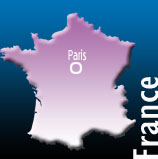No missiles in Europe until OSCE talks, urge EU, Russia
 Nice, France - The United States and Russia should both refrain from siting any new weapons systems in Europe before a major summit of European and North American powers in June or July 2009, the French and Russian presidents said on Friday.
Nice, France - The United States and Russia should both refrain from siting any new weapons systems in Europe before a major summit of European and North American powers in June or July 2009, the French and Russian presidents said on Friday.
The European Union is "concerned" by Russian threats to site missiles in its Baltic exclave of Kaliningrad, and "there should be no deployment ... until we have discussed the new geo-political terms for pan-European security," French President Nicolas Sarkozy said after talks with his Russian counterpart, Dmitry Medvedev.
But at the meeting in the French resort of Nice, he also urged the United States not to go ahead with plans to site a missile-defence system in Poland and the Czech Republic until the 56-member Organization for Security and Cooperation in Europe (OSCE) has debated it.
Until an expected OSCE summit in June or July 2009, "please let's not talk about the deployment of missile shields, which don't bring security and which complicate things," Sarkozy, current holder of the EU's rotating presidency, said.
Medvedev blamed his threat to site missiles in Kaliningrad on Poland and the Czech Republic, saying that it had been "a reaction to the behaviour of individual nations in Europe which, without consulting anyone, agreed to deploy new systems on their own territory."
But he also called on the United States to abandon its missile- defence programme in favour of a new security treaty, saying "before a global agreement (on European security), we should all refrain from unilateral steps that affect security in Europe."
Over the last year, Russia has repeatedly expressed outrage at the US missile-defence plans.
On November 5, Medvedev threatened that Russia would move missiles into its Baltic exclave of Kaliningrad, across the border with Poland and Lithuania, if the US plans went ahead.
But on Friday he also called for the creation of a "new pan- European space of security which could be joined by all nations and which could be a list of rules for the future," and which is "finding more and more support among EU leaders."
Sarkozy agreed that European and North American states should meet to discuss Medvedev's idea, first broached in June.
"I have proposed that we could meet, perhaps in the framework of the OSCE, in mid-2009 to discuss what could be a future pan-European security system. It is in the interest of all of us to achieve this on the continent and beyond," he said.
Medvedev welcomed that message, saying that August's war between his country and Georgia had shown that "the existing security mechanisms in Europe are imperfect, so we have returned to the idea of concluding a global treaty."
Ahead of Friday's meeting, Sarkozy had said that the OSCE, whose members include Russia, the United States, Canada and European states, should discuss it in late
2009.
But on Friday the two presidents "agreed that we don't need to wait until the end of 2009, we can do it in middle of the year on the basis of the OSCE," Medvedev said.
The EU, NATO and the Moscow-dominated Commonwealth of Independent States (CIS) and Collective Security Treaty Organization (CSTO) should also attend the summit, he said. (dpa)